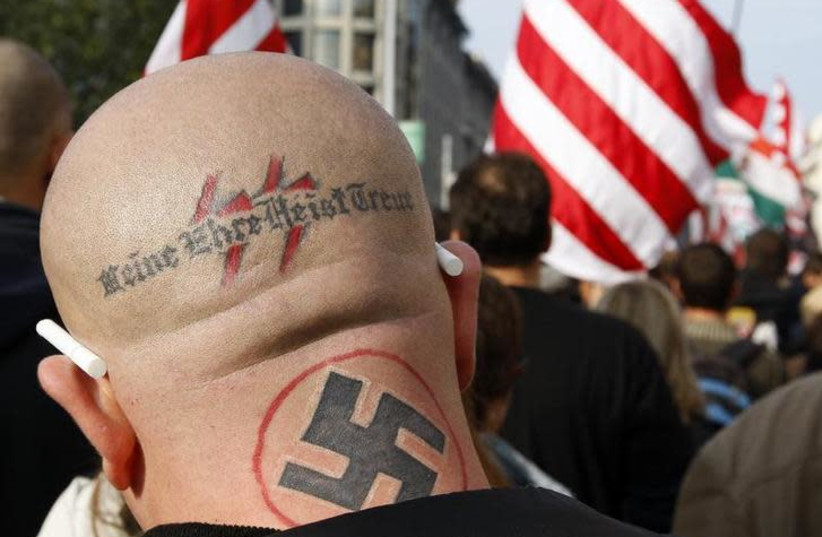There was a good deal of hand-wringing a few weeks ago after participants at a neo-Nazi rally in Orlando waved swastika banners and chanted antisemitic slogans: “The Jew is the devil” and “Jews rape children and drink their blood.” The rally was live-streamed on the American Nazi Party’s website.
Similar consternation was voiced when the Minnesota-based National Socialist Movement posted a 25-point manifesto on its website advocating an ethnostate in which only those with European ancestry (read non-Black) can be citizens. Its guiding principle was to fight for civil rights and self-determination of Whites in America.
Such racist rantings would not be cause for alarm were they regarded from a real-world perspective, as little more than the bigoted broadsides of a few radical fringe groups that are far outnumbered by a much larger population, most of which thinks quite differently.
Probably the best way to counter these groups is to ignore them completely. A more effective but logistically difficult response would be to stage a counter-demonstration.
One of the most successful of the latter sort occurred a full half-century ago, on a bitter-cold evening at the height of the Vietnam War, when thousands of youthful protesters huddled against the chill on the steps of the Capitol, singing “The Battle Hymn of the Republic,” “The Star-Spangled Banner,” “America the Beautiful” and “We Shall Overcome.” A veteran of the same war, ravaged by injury and conscience, repudiated his blood-earned decorations by hurling them away from his wheelchair.

It was a thoroughly peaceful demonstration at the very same building that was stormed last month by an armed mob seeking to overturn the results of a presidential election widely perceived as fair and efficient.
Perhaps more to the point, latter-day demonstrators might benefit most by understanding a simple but profound aphorism: America is a country continuously struggling for its soul.
For evidence, just look at the number of demonstrations that occur around the countryside day in and week out – some 10,000 a year by one conservative estimate and likely a lot more.
Whether attended by dozens or thousands, maybe the most revealing aspect about what’s right with America is its inclination toward self-scrutiny, self-criticism and self-realization. Practically everyone feels free to voice a grievance or fight for a perceived right and so we see many more peace demonstrators and consumer advocates than flag-waving white supremacists.
The First Amendment exists primarily to protect offensive expression and assembly, not just motherhood and apple-bobbing contests. The notable exceptions to freedom of speech, such as, obscenity, defamation, fraud, incitement and fighting words, are seldom prosecuted.
The government rightly bears a heavy burden of proof that any restrictions it puts on our civil liberties is absolutely necessary. We hold people accountable for their actions, not for their ethnic, political or religious identities.
When rhetoric turns to action, a verbal response is often insufficient. So when a group called the Institute for Historical Review offered $50,000 to anyone who could prove that the Nazis had used gas chambers to murder Jews in the Holocaust, a Holocaust survivor from California named Mel Mermelstein – disregarding calls from both the Simon Wiesenthal Center and the Bnai Brith’s Anti-Defamation to avoid bringing more attention to the IHR’s offer – responded to the challenge.
“I watched my mother and sisters being led to the gas chambers and they tell me it was a hoax. They are hate-mongers, Jew-haters. I’m going to get them if I have to spend the rest of my life doing it.” He submitted a memoir he’d written entitled Bread Alone: The Story of A-4685 – a reference to the number tattooed on his arm. When the Institute refused to pay the reward he sued in the best American tradition not only for the money offered, but for an additional $17 million in damages for injurious denial of established fact, as well as for libel, breach of contract and emotional distress.
One judge ruled that the fact Jews were exterminated in gas chambers at Auschwitz is not reasonably subject to dispute. Another judge ordered the IHR to pay the $50,000 in prize money, together with an additional $40,000 in damages, and to write a letter apologizing to the plaintiff and other Holocaust survivors.
Mr. Mermelstein died last week at age 95. There’s little doubt he would have prominently joined, if not led, counter-demonstrations against neo-Nazi or white-supremacist groups, wherever they creep up and not worry about the security concerns such attention might occasion.
In times of terror, tension and hate speech, we must fully understand the price to be paid when abandoning constitutional principles we’ve fought so long to preserve.
The perilous quest to preserve civil liberties in uncivil times is not an easy one, but the wisdom of Benjamin Franklin should remain a beacon: Societies that trade liberty for security end often with neither.
Kenneth Lasson is an emeritus professor at the University of Baltimore School of Law who has written widely in the areas of civil liberties and international human rights.
